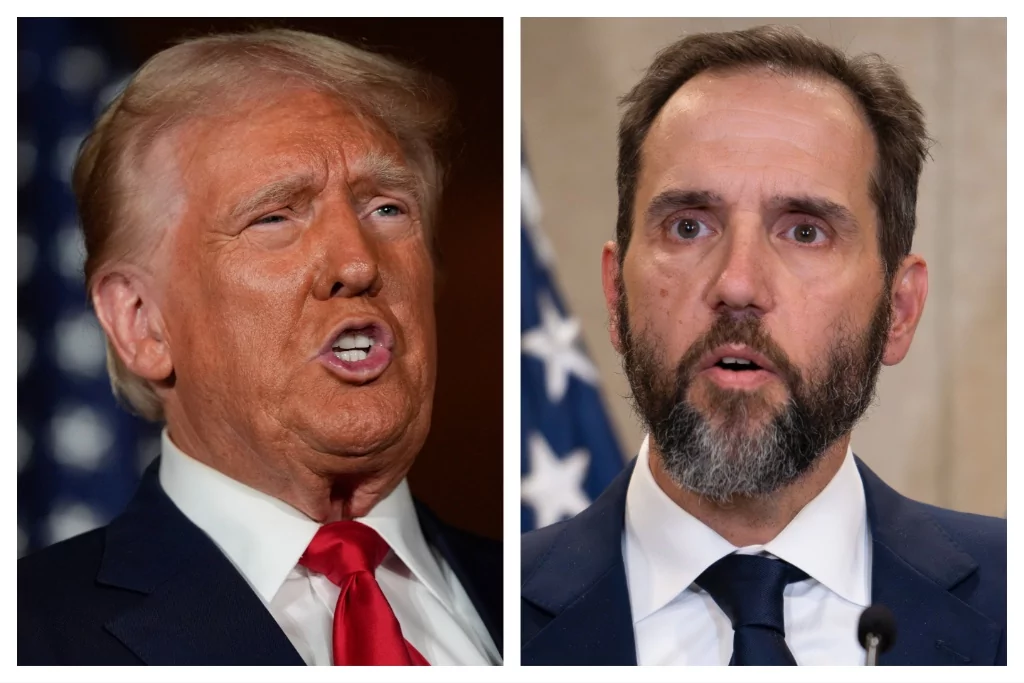

President-elect Donald Trump vowed throughout his presidential campaign to seek retribution against special counsel Jack Smith, who brought criminal charges against Trump that Republicans widely criticized as unfair.
Trump and his Republican allies in Congress, who will have complete control of Washington beginning in January, now aim to turn the tables and investigate Smith’s dual prosecutions of the president-elect.
Senate and House Judiciary committee members have sent preservation notices to Smith, telling him to save his records related to Trump, a sign that the lawmakers intend to summon testimony and documents from the special counsel next year.
TRUMP DEFENDERS POISED TO GO ON OFFENSE AT DOJ
Meanwhile, Trump’s attorney general nominee, Pam Bondi, said last year in a now-viral comment that “the prosecutors will be prosecuted, the bad ones,” signaling alignment with Trump’s mission to punish Smith for his work.
Smith was forced to terminate both of his cases against Trump, and his office plans to, according to reports, disband before Trump enters the White House. At the same time, Smith and his team are plotting out how best to respond to the anticipated GOP inquiries.
Below are top grievances against Smith that could become subjects of investigations.
1. Smith’s court activity during final campaign weeks
Smith raised eyebrows by filing a behemoth motion in court in October, a month out from the presidential election, in an attempt to defend his Jan. 6 case against Trump in the wake of the Supreme Court’s landmark immunity ruling.
The document contained details that Smith was deprived of presenting in a trial (since the case never moved to a trial stage), including damning and unflattering grand jury material about how Trump went about objecting to the 2020 election results.
Former federal prosecutor Elie Honig called the move an “October cheap shot,” blasting Smith for defying Department of Justice policy that prohibits prosecutorial activity that could affect an election.
Former assistant U.S. attorney Jack Goldsmith said the move was “in clear tension with the Justice Department’s 60-day rule” and that Smith owed the public an explanation for how the filing did not constitute election interference.
2. Bratt and Cooney
House Republicans have been seeking records from the DOJ for various misconduct allegations, including against two of Smith’s prosecutors, Jay Bratt and J.P. Cooney.
A misconduct allegation against Bratt was first raised in court by an attorney representing Walt Nauta, one of the co-defendants in the classified documents case against Trump. The attorney, Stanley Woodward, said that during a closed-door meeting, Bratt violated ethics rules by bringing up Woodward’s application to become a judge while Bratt was trying to goad Woodward into complying with him in the Trump case. Smith has disputed the accusation.
Cooney’s allegation relates to a prior case when he helped prosecute Trump ally Roger Stone for lying to Congress. According to a DOJ inspector general report, Cooney wanted to impose an unusually harsh sentence on Stone, and when he was overridden, he claimed that the Trump administration gave Stone preferential treatment. The DOJ inspector general assessed in his report that this was not a “well considered” move by Cooney, but Rep. Jim Jordan (R-OH) has continued to demand more information about it.
3. Using a DC grand jury in a Florida case
Some legal analysts, such as William Shipley, who has served as counsel for dozens of Jan. 6 defendants, have questioned why Smith used a Washington-based grand jury to bring charges against Trump in Florida over his handling of classified documents.
“He was almost certain to have greater success [in Washington] in trying to evade attorney-client privilege claims, to conduct the investigation into the classified documents case that almost certainly was going to be venued in Florida,” Shipley stated on X.
Judge Aileen Cannon, a Trump appointee who presided over the case, ordered Smith last year to “address the legal propriety of using an out-of-district grand jury proceeding.”
Smith replied that he was appropriately using the Washington grand jury to investigate narrow allegations of false statements, even if it had “incidental” advantages in the broader classified documents case.
4. ‘Conspiracy against rights’
Trump has called for Smith to be arrested, but it remains unclear what charges Smith could face for his work.
Article III Project founder Mike Davis, a fervent Trump supporter, recently teased a federal law associated with law enforcement misconduct and hate crimes, known as conspiracy against rights.
“Jack Smith and his office must face severe legal, political, and financial consequences for their blatant lawfare and election interference,” Davis said.
5. Early underlying political motivations
Sen. Chuck Grassley (R-IA), the incoming chairman of the Senate Judiciary Committee, has long raised concerns about politically driven investigators in authoritative roles at the FBI, including one who Grassley said helped Smith in the early stages of his investigations into Trump.
The former longtime special agent, Timothy Thibault, who handled public corruption matters in the Washington Field Office, drew attention from Grassley and other Republicans in 2022 based on whistleblower disclosures. Grassley has since tied him to Smith’s case.
CLICK HERE TO READ MORE FROM THE WASHINGTON EXAMINER
“Jack Smith court filing released 2day is part of case started by former FBI official Thibault who was forced 2retire bc of extreme anti-Trump political bias my oversight revealed This case was politicized frm start Releasing info this way reeks of undeniable partisan tactics,” Grassley recently wrote in an X post.
Grassley also suggested in a letter last month to the DOJ that he planned to examine Thibault’s role in Smith’s work when the GOP takes control of the Senate.




